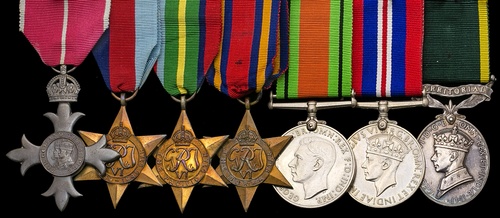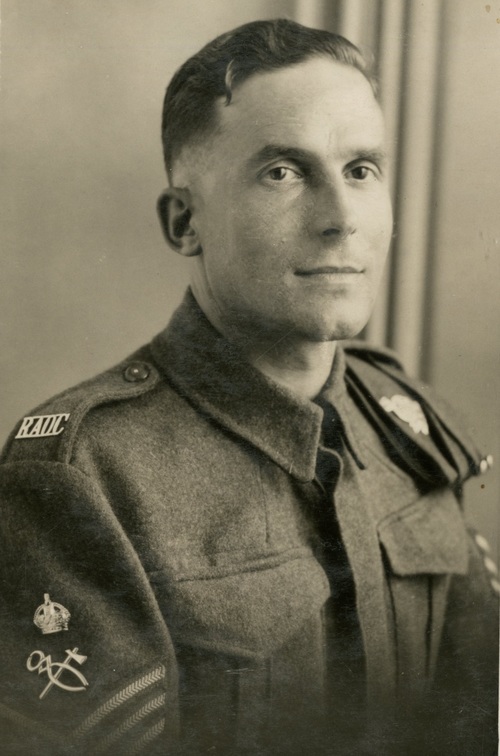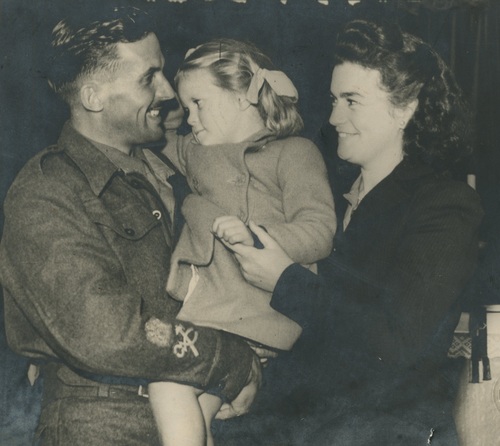Auction: 16003 - Orders, Decorations, Campaign Medals and Militaria
Lot: 5
SOLD BY ORDER OF THE RECIPIENT'S DAUGHTER
The Well Documented Second War 'Burma Railway POW Camp Commandant' M.B.E. Group of Seven to Warrant Officer II Class H.R. Miller, Royal Electrical and Mechanical Engineers, A Survivor of the Sinking of the R.M.S. Empress of Asia and Who Escaped the 'Alexandra Hospital Massacre', Taken Prisoner of War and Later Camp Commandant For the Seven Hundred Men of Kaorin Camp, Burma Railway
a) The Most Excellent Order of the British Empire, 2nd type, Military Division, Member's (M.B.E.) breast Badge, silver, with Buckingham Palace enclosure named to 'Warrant Officer Class II Harry R. Miller, M.B.E.', Royal Mint case and card box of issue
b) 1939-1945 Star
c) Atlantic Star
d) Burma Star
e) Defence and War Medals
f) Efficiency Medal, G.VI.R., with 'Territorial' scroll suspension (76025871 W.O.Cl.2 H.R. Miller. R.E.M.E.), with the named card box of issue and enclosure, this addressed to 'Mr H.R. Miller, C/O Construction Coy, P.O. Box 78, Nairobi', nearly extremely fine, together with the following related material:
- The related miniature awards
- Eleven photographs of the recipient
- The card box of issue for the Second War awards, this named 'Mr H.R. Miller, 26 Norwich Road, Bitterne Park, Southampton'
- Citation for the M.B.E.
- The recipient's Soldiers' Service and Pay Book
- Original copy of the Alexandra Hospital War Diary covering the dates 14-17.2.1942
- Assorted newspaper cuttings and copied research (Lot)
M.B.E. London Gazette 21.12.1946 7602571 Warrant Officer Class II Harry Ralph Miller, Royal Electrical and Mechanical Engineers
The citation reads: 'When at the end of 1944, the officers were segregated from KAORIN Camp, Siam, the above named Warrant Officer was left in charge of this camp, consisting of 700, British, Australian and Dutch prisoners of war, until the capitulation of Japan. He ran the camp under a particularly objectionable Japanese Commandant, who did everything in his power to make life unbearable. Miller, refused to be intimidated and was unceasing in his attempts to alleviate the lot of his men. The Japanese guards taking their cue from this Japanese officer were extremely brutal in their treatment of the prisoners of war, but Miller took all the worst cases up to the Japanese Commandant in an attempt to secure relief from the brutality of the guard. When the camp was taken over by a British Major immediately following the capitulation of he reported that he considered it to be one of the best run camps he had seen in Siam. It was clean and well run morale and discipline were excellent and no effort had been spared to secure the best possible rations for the prisoners of war. This excellent state of affairs was almost solely due to Miller's efforts, and in a very unenviable position he proved himself a good soldier, with a high sense of duty and responsibility to the men under his command.'
7602571 Warrant Officer II Class Harry Ralph Miller, was born on the 27th September 1911, at Chard, Somerset. A motor vehicle fitter by trade, he enlisted initially in the Royal Army Ordnance Corps in 1939, later serving Royal Electrical and Mechanical Engineers. Posted to serve in the Far East, Miller was aboard R.M.S. Empress of Asia for his transit. In the final stages of their journey, on the 4th and 5th February 1942 south of the Sultan Shoal Lighthouse, the convoy was attacked by Japanese bombers, with nine dive bombers focussing on the vessel. She was severely damaged and sank. A hand written report from Miller gives further detail:
'...At the time of the attack as I know it is as follows, I was sharing a cabin on 'B' Deck with Armt. S./Mjr. Stanley, S.Q.M.S. A. Thew, S.Q.M.S. R. Lambert, Armt. S./Sgt. Partridge, Armt. S./Sgt. McKercher. At the time of the attack I was just in the passageway outside the cabin with on Sgt. J. Caine with a typewriter on a chair, he was typing some Unit orders at my dictation, when suddenly the alarms sounded, Sgt. Caine immediately left for the troop deck, his warning station, I was putting on my equipment when suddenly there was a terrific explosion and I knew no more untill I found myself at the end of that companionway semi-conscious outside the Barbers Shop, I still don't know who helped me but I was dragged up a staircase to 'A' Deck and next I found myself propped up against the superstructure of 'A' Deck, in a short time the ship started to keel over so I jumped over the side. I was in the water a long time untill eventually half a dozen of us were picked up by some Chinese in a small boat...into Singapore and handed us over to the Military Police.'
Following his watery arrival into Singapore, Miller was admitted to the Alexandra Hospital for damage to the right knee following the sinking. With the fall of Singapore on the 15th February 1942, the Alexandra Hospital Massacre occurred when between 150 and 200 wounded servicemen and staff were slaughtered by the advancing Japanese forces on the 14th and 15th February. The War Diary of the Hospital, annotated 'I was in this Hosp. untill just minutes before this started' by Miller and is confirmed by family story. Miller left the Hospital but was made Prisoner of War upon the surrender, avoiding a forced march on account of his injury, permitted to travel upon the tailboard of a lorry. Following nearly eighteen months in Thailand, at Number 1 Camp, Miller was transferred to Kaorin Camp. His report sheds more light:
'All went well for one year then it was decided to transfer my 160 men to a Camp called Kaorin up country. We were put onto a train made of trucks loaded with 1 metre lengths of firewood, and sitting on top of our kits. After a few hours the train halted and we were made to dismount, the train went on, then the guards found it was the wrong place and decided to march us through the bush to the correct Camp. So after a short while my knee gave in again, they would have left me there as the two JAP guards were getting agitated as it was getting late and the darkness coming, so for me a S./Sgt. Scattergood and a Sgt. Gerard virtually carried me the remainder of the way, a S./Sgt. Topper Brown also helped with the gear as much as he could, when we entered Kaorin Camp the Guards were very excited and we were lucky not to be punished.'
Miller eventually acted as Camp Commandant for the 700 prisoners, following the removal of the British Officers. His Service Book adds detail:
'January 19th 1945. Detailed by Capt. Renwick 2.5 Sherwood Foresters (Commandant Kaorin P.O.W. Camp), as Senior W.O. to act as Camp Commandant in the emergency to exist in the removal of all Officers from Camps. To carry out our own Military discipline with the same powers as a Commissioned Officer untill the end of the emergency. W.O.1. MacKenzie B.H. A.I.F. detailed to act as Camp Adjutant in the place of Lt. Grey 7th Coast Regt. R.A.. Carried out these duties without any incident of serious character untill the arrival of Major Seekins Camb's Regt., taking over after the capitulation of the I.J.A. on the 20th August 1945.'
Miller left Kaorin Camp on the 4th September 1945 and returned home via Rangoon, Colombo and the Mediterranean, arriving home to Southampton on the 7th October 1945, to greet his wife and be introduced to his daughter, born a week after he had left for war.
Demobilised in January 1946, Miller and his family left the United Kingdom for East Africa, working for the Mowlem Construction Company as a Plant Manager. He retired in England, died 25.9.1990 and is buried in St. Peter's Church, Ashley, Hampshire.
Subject to 20% VAT on Buyer’s Premium. For more information please view Terms and Conditions for Buyers.
Sold for
£1,400









